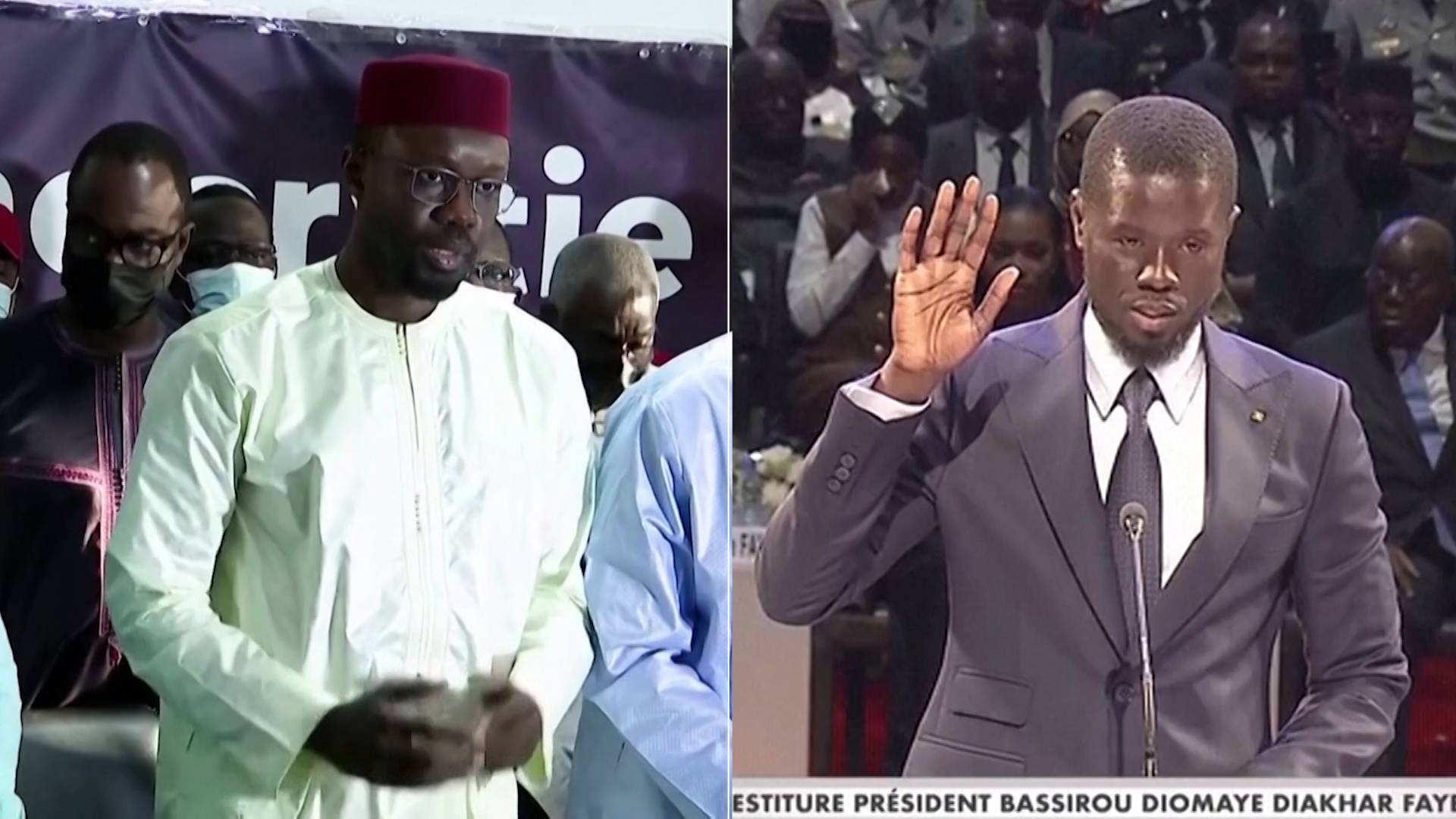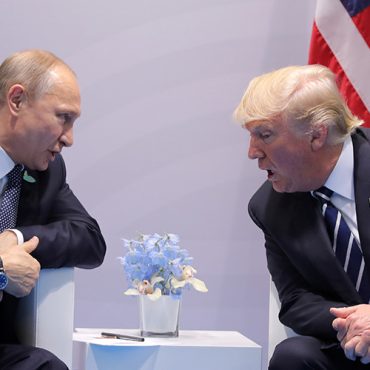This is a rush transcript. Copy may not be in its final form.
AMY GOODMAN: This is Democracy Now! I’m Amy Goodman, with Nermeen Shaikh.
NERMEEN SHAIKH: We end today’s show in Senegal, where the newly inaugurated president, Bassirou Diomaye Faye, has named Ousmane Sonko to be his prime minister, capping a remarkable three-week period that saw the two opposition figures go from prison to ruling Senegal, vowing to fight poverty, injustice and corruption. Faye and Sonko were released from prison in mid-March, just days before Faye won Senegal’s election to replace President Macky Sall, who had attempted to delay the vote. Faye was officially inaugurated Tuesday.
PRESIDENT BASSIROU DIOMAYE FAYE: [translated] Under my leadership, Senegal will be a country of hope, a country at peace, with an independent justice system and a strengthened democracy. This is my promise, based on the oath I have just taken before God and the nation, in your presence. … I am aware that the results of the ballot box express a profound desire for systemic change. Through my election, the Senegalese people have committed themselves to building a fair Senegal, a prosperous Senegal, a progressing Africa.
AMY GOODMAN: Faye is now Africa’s youngest elected president and announced in a televised speech Wednesday he’ll audit Senegal’s oil, gas and mining sectors, after vowing to renegotiate contracts with oil giants like BP.
For more, we go to the capital of Senegal, Dakar, to speak with Ibrahima Kane, a Senegalese lawyer and political analyst, and Aminata Touré, Senegal’s former prime minister.
We welcome you both to Democracy Now! Thank you so much for joining us. Let’s begin with former Prime Minister Aminata Touré. A few weeks ago, we spoke to you when you were detained in the mass protests against President Sall trying to delay the elections and extend his term. Can you talk about what happened in this last few weeks? The new prime minister and president were just in prison. This is quite a moment for Senegal.
AMINATA TOURÉ: Thank you for having me.
We have to backtrack a little bit for further context. President Macky Sall, two [years] ago, delayed his response when he was asked whether he’s going to run a third time. This triggered massive demonstration — unfortunately, with life lost. And then, finally, last year, he decided to drop the ball. But yet, when we were about to start the electoral campaign, he postponed the election to December. This triggered again a massive demonstration. I was arrested during the first march. And at the end, he had to submit himself to the decision of the Constitutional Council.
So, what this means is that although our democracy has been shaken, the foundation remains quite solid, because at the end, democracy prevailed. We went to election. And Bassirou Diomaye Faye and Ousmane Sonko got freed. They campaigned for the rest of the campaign, because when we started, they were still in jail. And today, as you said, Bassirou Diomaye Faye has been sworn as president, and Ousmane Sonko — he appointed Ousmane Sonko as his prime minister. So, the lesson to be learned is that, first of all, democracy is not given. You have to nurture it. You have to be vigilant. We have to alert, and we have to stand by democracy. And that’s the lesson that I learned from these months of struggle.
NERMEEN SHAIKH: Ibrahima Kane, if you could respond to the remarkable inauguration this week of Bassirou Diomaye Faye? What do you think the significance of this is? And if you could give us some background on who he is?
IBRAHIMA KANE: Well, Bassirou Diomaye Faye is a civil servant. I think he works for the Senegalese administration. With Ousmane Sonko, they decided to create a political party, which is called PASTEF, and to confront the system, as they call it, to make sure that the system works better for the citizens, because in Senegalese democracy, as we used to see it, the system used to work for those who are in power. The system used to work for those who managed to get power, to hold on in power, and they do everything for themselves, forgetting the population. And this is a young generation of Senegalese who really want to shaken the system, as they said, and to really make sure that the system works for the citizens, as we always hope that in a democratic system the citizens should be the first, and the citizen should be at the heart of any public policy.
Now Diomaye and Sonko are now in power. There is a lot of, lot of, lot of hope from citizens, not just to sort out their problems, and there is a lot of, lot of problems in Senegal. Even yesterday in his speech, he said the Senegalese are brave, but, really, they are very, very tired. They are very, very hungry. And there is a need to sort out their problems. And this is where I think the problem will come very soon, because there is the willingness of the two leaders to sort out problems, but is the Senegalese economy, is the Senagalese education system, is the Senegalese social system able to allow him to find jobs, to allow him to sort out some of these economic problems? I really doubt it. I really doubt it, because the state that they inherited is a state completely down. Completely down. And they have only five years. And I doubt that in five years you can really change, you can really make a shift in the Senegalese economic, political system. But I do hope that they will start taking specific action that will show to the population that at least this generation of leaders are more inclined to help the population than to help themselves. I think that’s where the line is.
AMY GOODMAN: And finally, the former Prime Minister Aminata Touré, they ran as a pan-Africanists. The significance of what they’re talking about when it comes, as Ibrahima was talking about, education, where women stand in this government, in this final minute that we have?
AMINATA TOURÉ: Well, first of all, I’d like to say that I’m a little bit optimistic that, you know, my panelist counterpart just spoke. There’s been some economic choices that need to be reversed, and then we will be able to make a lot of saving in the national budget. And that will improve definitely health and education policy, because President Macky Sall, whom I was his prime minister 10 years ago, invested much more in infrastructure than in building a social capital. So, that needs to be reversed. And I can tell you that there are niches where you can save money and redirect those resources toward the people. So, that’s my first thing.
The second thing is, I really share the vision of having Africa as one global space, but starting maybe by West Africa with ECOWAS, the ECOWAS space. We do have within ECOWAS Nigeria, that is the first economy in Africa, before South Africa, before Egypt or Algeria. So, this is a lack. And they are looking forward to a more integrated zone, economic zone. And that [inaudible] —
AMY GOODMAN: Aminata Touré, we’re going to have to leave it there, but we’ll continue this discussion, Senegal’s former prime minister, and Ibrahima Kane, Senegalese political analyst, speaking from Dakar.
That does it for our show. Saturday night, I’ll be speaking in Berkeley at KPFA’s 75th anniversary celebration. Check our website at democracynow.org. I’m Amy Goodman, with Nermeen Shaikh.











Post comments (0)